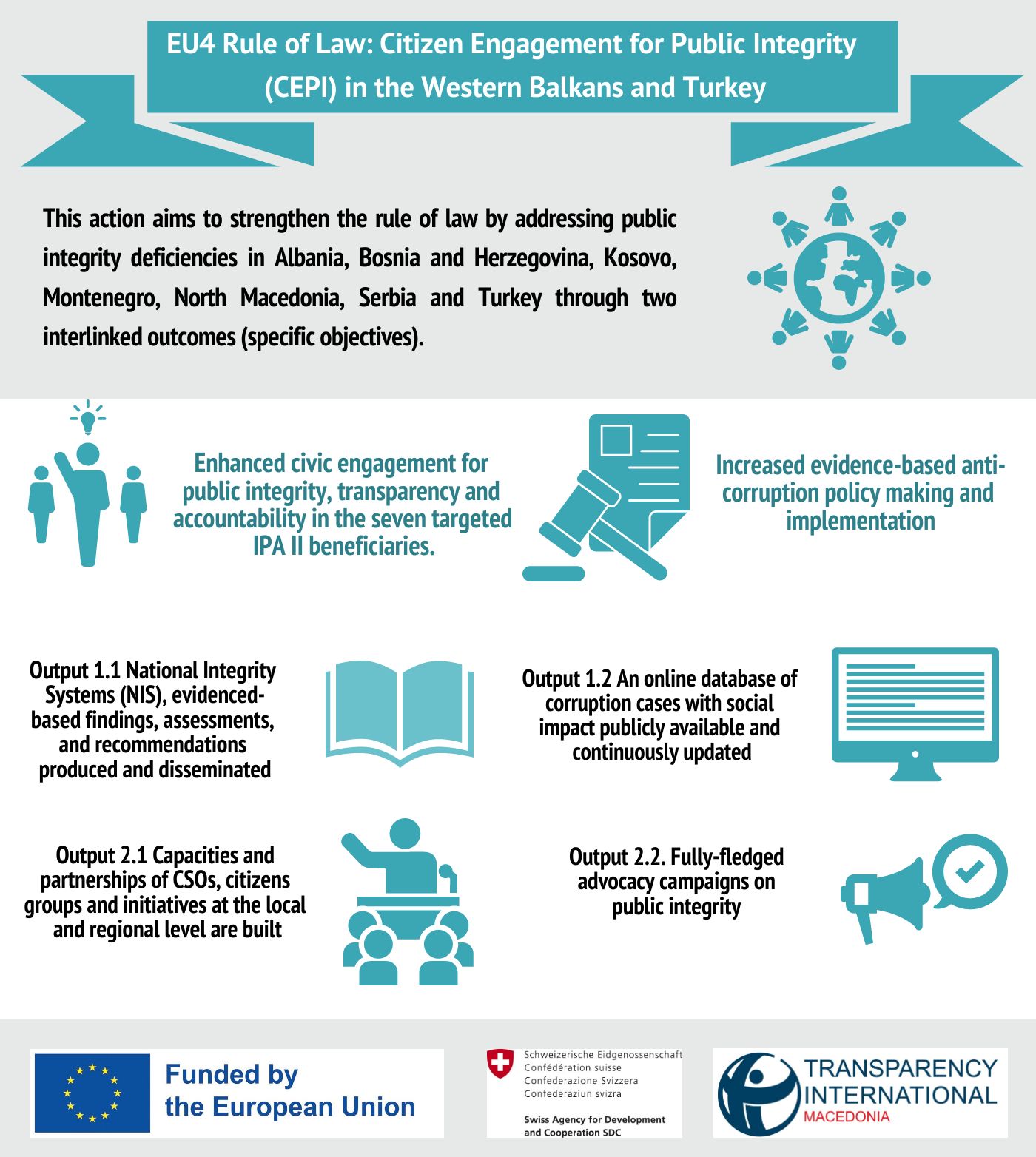Period of implementation: 01 January 2022- 31 December 2024
Donor: European Union and Government of Switzerland
Objective
This action aims to strengthen the rule of law by addressing public integrity deficiencies in Albania, Bosnia and Herzegovina, Kosovo, Montenegro, North Macedonia, Serbia and Turkey through two interlinked outcomes (specific objectives), namely 1) increased evidence-based anti-corruption policy making and implementation and 2) enhanced civic engagement for public integrity, transparency and accountability in the seven targeted IPA II beneficiaries.
Activities
The action foresees two different but interlinked outcomes, building upon lessons learnt of actions fighting anti-corruption that have been implemented in EU Member States. All outputs and associated activities are connected and mutually reinforcing. The results of the NIS assessments (output 1.1) and the comprehensive public online database of corruption cases with social impact (output 1.2) will provide concrete inputs to the advocacy campaign (output 2.2) which will also serve to strengthen partnerships of CSOs, local citizens groups and initiatives at the domestic level and regionally (output 2.1).
Activities under Output 1.1 National Integrity Systems (NIS), evidenced-based findings, assessments, and recommendations are produced and disseminated:
– Developing a research plan (based on already updated NIS methodology), including organising NIS training workshop
– Consultations with stakeholders and experts, and where applicable, establishing of beneficiary advisory groups composed of key stakeholders
– Data collection and analysis
– Developing and revising NIS reports
– Publication and dissemination of beneficiary-level NIS assessments (seven in total)
– Drafting, publication and dissemination of comparative regional NIS report (one in total)
– Developing policy proposals based on NIS assessments on priority and cross-cutting issues relevant for advocacy
– Developing beneficiary reports on tracking key NIS recommendations and NIS online tracking mechanisms tools with respect to NIS findings
Activities under Output 1.2 An online database of corruption cases with social impact is publicly available and continuously updated
– Mapping and taking stock of possible initiatives
– Defining inclusion criteria of cases and systematic step-by-step search methodology
– Developing database tools
– Collecting data about cases
– Writing description of cases (fact-checking, editing, libel-checking, translation)
– Publishing cases in the database
– Monitoring and updating of cases in the database
– Developing policy proposals based on database findings on priority and cross-cutting issues relevant for – advocacy
– Organising database launch events
Activities under Output 2.1 Capacities and partnerships of CSOs, citizens groups and initiatives at the local and regional level are built
– Mapping local and regional CSO landscape
– Defining standards for assessing capacity-building needs of CSOs and grassroots groups and implementing a needs assessment
– Mapping existing capacity-building knowledge, toolkits and initiatives, and developing regional general and beneficiary-specific tailor-made toolkits for capacity-building of CSOs and groups
– Connecting grassroots and cross-border initiatives between civil society actors on anti-corruption issues
– Organising capacity-building trainings, workshops and mentoring opportunities (online and offline) on anti-corruption advocacy based on generated knowledge from NIS and database
– Organising consultations with CSOs, experts and peer-to-peer exchanges
Activities under Output 2.2. Fully-fledged advocacy campaigns on public integrity are delivered
– Conducting stakeholder and power analysis and rapid risk assessments
– Developing advocacy and campaign plans at the domestic and regional level (based on NIS, database and mapping of CSO needs)
– Designing, producing and disseminating advocacy materials and tools (e.g. leaflets, blogs, open letters, brochures, videos, infographics, stories/blog posts, visual aids)
– Organising outreach and awareness-raising campaigns, grassroots and joint advocacy actions (e.g. performances, competitions, events for students, petitions, exhibitions, festivals etc.) with targeted local and regional CSOs and groups on the effects of corruption on different themes (e.g. women’s rights, environment, youth)
– Developing citizen’s personal corruption-related stories or case studies developed from database or NIS assessments illustrating the social impact of corruption (also positive, successful narratives)
– Organising campaign events (e.g. press conferences, launches, conferences, debates, workshops, policy dialogues or other types of events) with decision-makers (online, hybrid or in-person) to seek advocacy plan goals based on produced knowledge on local and regional level
– Media outreach activities promoting campaign on local and regional level Description: Media engagement will be an essential part of the campaign to increase
– Facilitating regional cross-border exchanges between CSOs to strengthen strategic advocacy and visibility on issues at the domestic level
– Developing joint statements between the domestic, regional and international CSOs and leveraging the strength of the TI Movement to amplify messaging in international media


